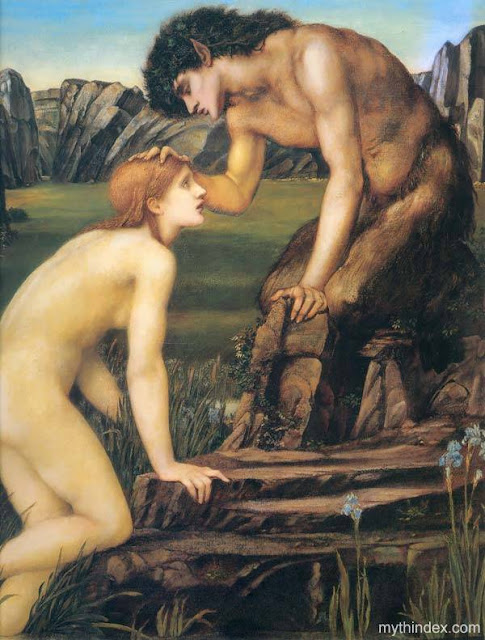PAN, the great god of nature, was not a handsome god. He had goat's legs, pointed ears, a pair of small horns, and he was covered all over with dark, shaggy hair. He was so ugly that his mother, a nymph, ran away screaming when she first saw him. But his father, Hermes, was delighted with the strange looks of his son. He carried him up to Olympus to amuse the other gods and they all laughed and took him to their hearts. They called him Pan and sent him back to the dark woods and stony hills of Greece as the great god of nature. He was to be the protector of hunters, shepherds, and curly-fleeced sheep.
Pan was a lonely and moody god. When he was sad, he went off by himself and hid in a cool cave. If a wanderer happened to come upon him and disturb him in his retreat, he would let out a scream so bone-chilling that whoever heard it took to his heels and fled in a fear that they called panic.
But when Pan was in a good mood, and that was mostly on moonlit nights, he cavorted through glades and forests, and up steep mountain slopes playing on his shepherd's pipe, and nymphs and satyrs followed dancing behind him. Sweet and unearthly were the tunes that floated over the hills.
The satyrs much resembled their master, Pan, but they were mischievous and good for nothing except for chasing nymphs. Old satyrs, or sileni, were fat and too lazy to walk. They rode about on asses, but they often fell off, since they were fond of drinking wine.
The light footed nymphs always looked young, though some of them were very old in years. Their life span was so long that they were almost immortal: they lived ten thousand times longer than man. There were water nymphs and nymphs of mountains and glens. There were nymphs who lived in trees and nymphs who lived in springs.
When a tree grew old and rotted, the nymph who lived in it moved to another tree of the same kind. A wood chopper, about to fell a healthy tree, must remember first to ask permission of the tree nymph. If he did not, she might send out a swarm of bees to sting him, or she might turn the ax in his hands so he would cut his own leg instead of the tree trunk. A thirsty hunter must never drink from a spring without asking the water nymph's permission. If he ignored the nymph, she might send a venomous water snake to bite him, or she might poison the water and make him sick.
River-gods, too, had to be asked before anyone took water from their rivers. They were usually helpful and friendly to men and willingly shared their water, but woe to the one who tried to carry off their water nymph daughters. They would rush out of their river beds and charge him in full river-god rage. They were dangerous opponents, for they grew ox horns on their heads and could change their shapes at will. Zeus himself feared their rage, and Pan and the satyrs kept well out of their way, though Pan liked all nymphs and fell in love with many of them.
Pan was a lonely and moody god. When he was sad, he went off by himself and hid in a cool cave. If a wanderer happened to come upon him and disturb him in his retreat, he would let out a scream so bone-chilling that whoever heard it took to his heels and fled in a fear that they called panic.
But when Pan was in a good mood, and that was mostly on moonlit nights, he cavorted through glades and forests, and up steep mountain slopes playing on his shepherd's pipe, and nymphs and satyrs followed dancing behind him. Sweet and unearthly were the tunes that floated over the hills.
The satyrs much resembled their master, Pan, but they were mischievous and good for nothing except for chasing nymphs. Old satyrs, or sileni, were fat and too lazy to walk. They rode about on asses, but they often fell off, since they were fond of drinking wine.
The light footed nymphs always looked young, though some of them were very old in years. Their life span was so long that they were almost immortal: they lived ten thousand times longer than man. There were water nymphs and nymphs of mountains and glens. There were nymphs who lived in trees and nymphs who lived in springs.
When a tree grew old and rotted, the nymph who lived in it moved to another tree of the same kind. A wood chopper, about to fell a healthy tree, must remember first to ask permission of the tree nymph. If he did not, she might send out a swarm of bees to sting him, or she might turn the ax in his hands so he would cut his own leg instead of the tree trunk. A thirsty hunter must never drink from a spring without asking the water nymph's permission. If he ignored the nymph, she might send a venomous water snake to bite him, or she might poison the water and make him sick.
River-gods, too, had to be asked before anyone took water from their rivers. They were usually helpful and friendly to men and willingly shared their water, but woe to the one who tried to carry off their water nymph daughters. They would rush out of their river beds and charge him in full river-god rage. They were dangerous opponents, for they grew ox horns on their heads and could change their shapes at will. Zeus himself feared their rage, and Pan and the satyrs kept well out of their way, though Pan liked all nymphs and fell in love with many of them.



Comments
Post a Comment